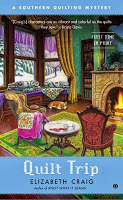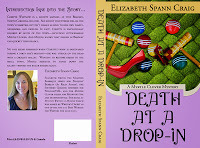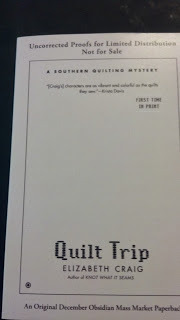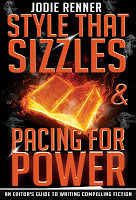Riley Adams's Blog, page 146
October 22, 2013
Cover Conferences
By Elizabeth S. Craig, @elizabethscraig

Traditional publishing is a funny
thing. It’s a hurry up-and-wait type
of business. Sometimes (quite frequently,
actually), everything moves at glacial speed.
But sometimes, things happen before you’re ready. And you never really know what’s going on
behind the scenes exactly to cause
either one.
I heard from my editor on Friday that
she’ll be attending—today, actually— the cover conference for the book that I’m
currently writing. This is a book that’s
due in January that will publish October 2014.
For some reason, everything that’s happened with this book has happened
earlier than I was ready for, and it’s made me a bit flustered. This is the same book where the teaser chapter
was due at the same time as the outline, but then the outline had requested
revisions…you remember.
This is the series where the editor (and
I love this editor—she’s very talented and I live in fear that she will be
promoted and won’t be my editor any longer), really likes me to be involved
with the cover process. Each time I
assure her that’s not necessary and I don’t know a darn thing about design—but
she’s good to keep at me and encourage me.
I’m sure, looking back now, that despite the fact I’ve dragged my feet
for every cover—it’s helped me out with the self-pubbed covers that I’m a good
deal involved in.
This is a cozy mystery, so there are
elements that need to be on the cover for branding both the genre and my
series. It will most definitely have a
corgi on the front of it, and I’m sure I would hear from the readers if it
didn’t. It will have a very peaceful,
picturesque scene with an element of danger in it—an overturned glass of red
wine, a knife to the side, a broken chair.
And, because the series hook involves quilting, there will be quilts.
The title was the first thing the editor
asked me about. She and the copy editors
had ideas for titles and she asked for my feedback on them. This is another area where I appreciate their
contacting me, but I know they usually have their own ideas for titles and
marketing plays a role. I do come up with ideas for titles…they tend to not use
them. :) But they’re very polite about
considering them.
Branding the covers in a series also
involves the way the title appears on the cover—font, appearance. It can even
go to the level of whether it’s an outdoor scene or an indoor scene.
My editor was going to attend the
conference with information off my old outline and I hadn’t updated her with a
new outline (oops) that reflected the changes we’d agreed on earlier. So…I agreed
to the changes she suggested, but didn’t correct the outline and send it to
her—instead, I scribbled the changes on my hard copy of the outline. That was clearly not helpful. Now I’m in a time crunch and don’t actually
want to stop to edit the outline and send it her way, especially since I’m
halfway through writing the book.
So she asked for the unedited copy that
I’ve written so far so that she could skim it for more ideas for setting the
cover using scenes from the book. This is the third time this has happened with
different series and now I hardly even blink an eye. Earlier, it would freak me completely out to
send what essentially was a disaster over to my editor. This time I attached the file with the
warning that although the teaser chapter one was in perfect shape but the
second and third chapters would be extensively rewritten…since there were two
more characters to add to them, and the other chapters should be fairly static
in terms of major changes. The text didn’t even have chapter breaks included
and had notes to myself included throughout.
At this point, though, it’s more of a trust issue—I know that she knows
that I’m not going to turn in something like that in January. So it’s easier to send it.
I
also sent along, at her request, pictures of quilts that were similar to ones
that I was writing into the story.
Honestly, I’ve never had a problem with a
cover that either Penguin or Midnight Ink has done—they tend to do beautiful
covers. I’ve heard horror stories from
other traditionally published writers about covers they’ve had and how they
feel the covers affected the sales of their books. I’m sure if I’d gone through a horrible
experience, I would be a lot more
involved in the process, except…well, I don’t know what I’m doing. I only know what I like and don’t like.
For both my other Penguin series and the
Midnight Ink book, the covers were done and it was more of a fait accompli
and I was asked afterward if I had any changes or if I approved of
them. So I didn't have the input on those
covers…and I will say that I think this is a lot more the case with most of the
big publishers…my experience with my editor and this series is more the
exception than the rule.
For my own self-pubbed books, I’ve taken
a page from my publisher’s book and branded the series as well as I could,
especially for using a couple of different cover designers …most recently Scarlett
Rugers. I have the sweet scene and the element of danger. And no images of people on the cover—there’s
never been a person on any of my covers so I won’t start now. Well, there’s been a dead person’s hand. That’s as close to human as has been on a
cover. I try primarily to make sure that
the color scheme used and the setting tell readers that there’s a new book in
my series…and that it’s the same series.
The difference with the self-pub is that
I think my designers have a sense of relief that I’m not trying to backseat
drive with the covers—I’ll throw in what I’m looking for and pick my
favorite design…maybe ask for small changes. But that’s the thing—I’m no
designer and I have no time to try to become one. I’d rather be writing more books.
But I do want it to look good in
thumbnails. I do want the
thumbnail-sized image to clearly belong to the rest of the series. And I want both my name and my series name
to be obvious on the cover—I need readers to find my books.
This is
how I start the cover process for the self-pubbed books:
I ask if they’re backed up. This is
important—if they are significantly backed-up, I’ll need to use someone else.
I give them the sales copy/back cover
copy that I’ve written for the book.
I give them a paragraph of ideas for
setting the cover. For the book that
came out in August, I emailed: “The cover scene could be set in a backyard.
We could consider using a croquet set or croquet mallet as the murder
weapon/dangerous object to indicate it's a mystery. Since the murder occurs
during a party, we could show a cocktail or wine glass spilled over on the
patio furniture, or a broken high heel...something like that.”
I attach pictures of the other books in
the series, if the designer hasn’t worked with me before.
I tell them what precisely I need in
terms of format. These days, I say: “I'm
interested in an ebook cover (the book will run on Nook, Kindle, iTunes,
Smashwords), a print cover (spine and back cover for CreateSpace), and an
audiobook cover for ACX.”
I give the ISBNs and the price to be
printed on the cover of the CreateSpace project.
That’s pretty much it. Then I field any questions from the designer.
(I do maintain a free database of cover
designers and other self-publishing professionals here
if you’re looking for a place to start.)
If you’re published, how involved were
you in the process? Does you genre have
a standard “feel” for its covers? If
you’re not yet published, how interested are you in being part of the cover
design?
Published on October 22, 2013 21:01
October 20, 2013
What's Important in a Story
By Elizabeth S. Craig, @elizabethscraig

I was going through my blog reader
recently and came across an interesting post from writer Jeff Cohen: “Stuff
Not to Do” on the Hey,
There’s a Dead Guy in the Living Room blog.
The whole article was good, but the part that particularly caught my eye
was this:
“Don't
decide on the crime and then create a character to fit it. Character
comes first. The crime is the bait; it's what Alfred Hitchcock called "the
MacGuffin," something the people in your book are desperate about but the
reader should find secondary. Your characters are first. Write characters the reader
cares about one way or another, and you're halfway home. Killing someone with a
guillotine in the middle of Indiana isn't the key to your book.”
I thought Jeff nailed it.
I don’t know how long it took me to
figure this out, but it was a while. I
thought, since I was being paid to write mysteries, that my primary focus was
that mystery…for you, it might be the magic in your fantasy or the science in
your science fiction. It was very
important to me to get my clues, red herrings, motives, murders, and solution
perfectly written. And I think I did a
good job with that. But one day, one of
my editors told me, “Elizabeth, your mystery is very sound. But what your readers particularly care about
is the characters. What’s going on with them? I’d like to see more of what they’re up to in
between the time while they’re working on the case.”
When I was starting out my series, I thought that the interpersonal
relationships of my characters, their problems, what was going on in their
non-mystery-solving lives was interesting to me,
but I wasn’t sure if my editors were going to perceive it as filler that needed
to be edited out. After all, wasn’t I
deviating from the plot—the mystery?
Then I realized that the in-between stuff was the way I was connecting
to my readers—the characters were pulling them into my story. Readers had purchased my book in order to
read about my characters…who just happened to be solving a murder mystery while
my readers caught up with their lives.
In some ways, the subplots that developed my characters and hooked
readers were just as important as the A Plot—the mystery itself.
I can write a 45,000 word book that’s
solely the mystery. That’s as long as it
takes to introduce suspects, outline the crime, and focus on an investigation
and a puzzle and a solution. But that’s only the puzzle—straight mystery. Adding in the subplots, the personal
interaction between characters, their conflicts, the way the mystery affects
them…this adds in about 30,000 more words.
It’s not fluff, either—it’s character development. It’s all about hooking the readers with the
character personalities.
Why would readers read my mystery,
otherwise? They wouldn’t care about the
victim (who is frequently a nasty personality anyway), they wouldn’t have
enough information to identify with or pull for the sleuth, and the
suspects…well, they’re all suspected of murder.
To hook readers, you have to make them care about all of the
characters—even the victim. The reader
has to care enough to want this case to be solved and to solve it alongside the
protagonist. To help out.
This is true with any genre. As Jeff Cohen put it, the genre functions as
the MacGuffin. It’s not all about the romance or paranormal aspects of a
story’s creatures, the science fiction or the fantasy. Those function as just the premise that lures
readers of that genre to our books. Most
popular books are popular because of the characters populating them.
As a reader and writer, how important are
the characters to you? How do you enrich
the story by revealing more about them while still keeping up your story’s pace
and keeping to your genre restrictions?
Published on October 20, 2013 21:01
October 19, 2013
Twitterific
By Elizabeth S. Craig, @elizabethscraig

Twitterific links are fed into the Writer’s Knowledge Base search engine (developed by writer and software engineer Mike Fleming)
which has over 23,000 free articles on writing related topics. It's the search
engine for writers.
November 13-14: Get
Read – Marketing Strategies for Writers: Dan Blank’s We Grow Media is a two-day online conference for authors looking
for promotion strategies--and, ultimately, readers. Speakers include Porter
Anderson, Chuck Wendig, Dan Blank, Jane
Friedman, Therese Walsh, and many
others. (I'm one of the scheduled
speakers and am also am serving on the advisory board.) More information about the conference and
registration information can be found here.
If you use the
discount code elizabeth, you receive $20
off the conference price.
There's a new
resource for writers—whether you’re writing your first book, trying to query
agents or editors, or whether you’re working on promo. It’s Alex J. Cavanaugh’s Insecure
Writer’s Support Group website. There you’ll find pages of links to
resources—writing tips, publishers, agents, queries, self-publishing,
marketing, contests, and publications for writers. Alex is a friend and
frequent commenter here and very active in supporting writers. Thanks to Alex
and his helpers for compiling the information for the site.
Current WKB
newsletter features an interview with @DanBlank: http://bit.ly/169ZsID.
Includes discount code for Nov. online con,#GetRead.
A look at what goes into narrating an
audiobook: http://dld.bz/cSwgh @authorterryo
@CaptPamsVoice @KelleyHazen1
Traditional Publishing: One Reason Not to
Choose It: http://dld.bz/cSwpj
Thoughts on changing genres and using pen
names: http://dld.bz/cS2tZ @tobywneal
@KristineRusch @Porter_Anderson
When readers drift away from series they
used to love: http://dld.bz/cS3EX @mkinberg
After the Critique: Sorting the Good
Advice from the Bad: http://dld.bz/cS3YU
@RMFWriters @Lori_DeBoer
The future of reader engagement and a
warning against hurrying through our writing: http://dld.bz/cS8eD
@Porter_Anderson
Getting Started With Character Structure:
http://dld.bz/cSAmZ @camillelaguire
A free directory of cover designers,
formatters, freelance editors, and more: http://bit.ly/nolbXq
Tips To Run The Optimal Goodreads
Giveaway: http://dld.bz/cShJb @publishingllc
12 myths to forget in order to become a
better writer: http://dld.bz/cShJR @pubcoach
5 Must-Haves For a Successful Writers
Conference Experience: http://dld.bz/cShJZ
How Smart Writers Deal With One-Star
Reviews: http://dld.bz/cShKd @hughosmith
7 Ways to Develop a Stronger Writing
Voice: http://dld.bz/cShKk @ChilaWoychik
Are readers changing and what does that
mean to writers? http://dld.bz/cShKt
@rchazzchute
Elizabeth Gilbert: What All Writers Can
Learn From Her: http://dld.bz/cShKx
@danschawbel @forbes
10 Rules for Writing First Drafts: http://dld.bz/cShK2 @copyblogger
The Self-Publishing Myth: Why Most
Self-Publishers Don't Work and What to Do About It: http://dld.bz/cShK9 @GerarddeMarigny
6 Habits of Highly Successful
(Screen)writers: http://dld.bz/cShKC
@noflimschool
8 Questions To Ask Yourself Before
Choosing A Writing Coach: http://dld.bz/cSpWD
@KimberleyGraham @SouthrnWritrMag
Poets discuss poetry and writing: http://dld.bz/cSpX4 @Nationalpost
How to win NaNoWriMo: Realistic Goals,
determination and a bottomless pot of coffee: http://dld.bz/cSpX9
@EliseVanCise
Learning to Fall: http://dld.bz/cSpXC @ElaineNeilOrr @womenwriters
Do You Have What it Takes to Survive
Indie Publishing? http://dld.bz/cSpXZ
@susankayequinn @beccajcampbell
A Quick Inspiration Tip: http://dld.bz/cSrpJ
When is a Good Time to Tell Instead of
Show? http://dld.bz/cSrpK @ava_jae
Getting Ready For #NaNoWriMo : http://dld.bz/cSrpN @woodwardkaren
Tying theme to each archetypal character:
http://dld.bz/cSrpR @glencstrathy
Writing lessons learned from "The
Maze Runner" : http://dld.bz/cSrpS
@juliemusil
Essential Tools to Organize Your Book
Manuscript: http://dld.bz/cPPqE @writeabook
Should You Pitch (and Sign With) a New
Literary Agent? The Pros and Cons: http://dld.bz/cSrqf
@ChuckSambuchino
5 Cool Places to Find Writing Inspiration
Online: http://dld.bz/cSrqu @JodiLMilner
Memory in Fiction and
Memoir--"Peeling the Onion": http://dld.bz/cSrqw
@KimsCraftBlog
6 reasons a workshop jolts your writing: http://dld.bz/cSrtp @HCasavant @thewritermag
World Building: Underworlds: http://dld.bz/cSrtq @EllenBooraem
Checking your creative path: http://dld.bz/cSrts @tannerc
The Chemistry Between Writer and Reader: http://dld.bz/cSrtv @TrishaNicholson @FCMalby
Dialogue Do's and Don'ts: Crafting Lively
and Believable Back-and-Forth on the Pages of Your Book: http://dld.bz/cSrtw @writeabook
How Self-Published Authors Can Improve
Our Industry: http://dld.bz/cRGHj
@mollygreene
What Makes A Good Short Story: http://dld.bz/cSbv5 @BAShortStories
The top ten lies of copywriters: http://dld.bz/cSsZJ @mstibbe
Self-publishing lends flexibility to
projects that demand it: http://dld.bz/cSsZU
@kristinerusch
Creative Flow: How to Silence Negative
Voices and Write: http://dld.bz/cSsZY
@sarajevojosh
Don't Build Worlds on Your Doorstep: http://dld.bz/cStaa @GeoffreyGudgion
@civilianreader
Answers to Questions About Plurals: http://dld.bz/cStaj @writing_tips
Advice For Writers From Literary Agents: http://dld.bz/cStak @ChuckSambuchino
6 Ways to Write Better Bad Guys: http://dld.bz/cStav @BrianKlems
10 tips on starting and sustaining an
online writer's group: http://dld.bz/cStay
@DeniseCCovey
Writing and the Rule of Three: http://dld.bz/cSta8 @ashkrafton
How Not To Treat Your Editor: http://dld.bz/cPYW4 @edsikov
Agents and Editors on "New
Adult": http://dld.bz/cSwp4
@dpeterfreund
5 Common Networking Mistakes: http://dld.bz/cSwqe @thewritermama
Don't Kill Your Thrills With Premise
Implausibility: http://dld.bz/cSwqk
@jamesscottbell
Ten Things to Help Defeat Writing Slumps:
http://dld.bz/cSwtc
5 Things You Shouldn't Say to Authors: http://dld.bz/cSwuT @brandontietz
How Smashwords Authors Can Manage Books
in a Series: http://dld.bz/cSwuX @galleycat
Writing as Vocation: http://dld.bz/cSwve @shewrites
Character Analysis--Alpha Dogs: http://dld.bz/cSwvj @camillelaguire
Crime fiction--characters who adopt new
personas: http://dld.bz/cSwvv @mkinberg
Writing Toxins: Optimising A Fully
Functioning Mind: http://dld.bz/cSwv6
@cateartios
Villains Who Would Make Great
Protagonists: http://dld.bz/cSwvX @Marie_Lu
The Fundamental Skills Of Creative
Thinking: http://dld.bz/cSwwP
The 'Magic Trick' to Selling a
Screenplay: http://dld.bz/cSwxf @Scriptmag
@jeannevb
Agents aren't required to sell books: http://dld.bz/cQd6M @deanwesleysmith
Physical Attributes Thesaurus Entry:
Voice: http://dld.bz/cSy34 @beccapuglisi
The Reality of Working From Home: http://dld.bz/cSy3Q @FinishedPages
Being trad-published means knowing the
market: http://dld.bz/cSy4r @sally_apokedak
5 Ways To Become A Confident Writer: http://dld.bz/cSy47 @chgriffinauthor
50 Things Under $50 Bucks To Promote Your
Book: http://dld.bz/cSy4F @bookgal
Comics & Film--More Than Storyboards:
Collaboration – The Smartest Person in the Room Isn't You: http://dld.bz/cSy5e
@tylerweaver
The Value of a Writing / Reading
Community: http://dld.bz/cSy5r @jeanoram
Strong Character Is Strong? http://dld.bz/cSy5u @mooderino
The indie publishing option for short
fiction: http://dld.bz/cSy5V @smithwritr
Are you writing a mystery or a suspense
novel? http://www.booksandsuch.biz/blog/are-you-writing-a-mystery-or-a-suspense-novel/
3 Writing Rules that Can Derail Your
Story: http://dld.bz/cSzb4 @LisaCron
Writing Fiction for Children – Character
Believability and Conflict: http://dld.bz/cSzbU
5 Things a Writer Always Overlooks: http://dld.bz/cSzbY @victoriamixon
From Traditional to Self-Publishing: One
Editor's Journey: http://dld.bz/cSzc2
Why do creative people suffer from
depression? http://dld.bz/cSzcM
@_RobbieBlair_
Screenwriters: Being Solely Identified by
Your Scripts Leads to Permanent Identity Crisis: http://dld.bz/cSzcV
@NancyNigrosh @akstanwyck
Gothic Intersections: History, Story,
Memory: http://dld.bz/cSze4 @GothImagination
11 Most Evil Characters in Books: http://dld.bz/cSzeM @PublishersWkly
Crowdsourcing for editing: http://dld.bz/cSzfa
Tricking yourself into writing more: http://dld.bz/cSzfw
Real Life Diagnostics: Is This Opening
Working? http://dld.bz/cSzfF @janice_hardy
Why You Should Self-Publish: http://dld.bz/cSzgj @hughhowey
10 Ways to Goose the Muse: http://dld.bz/cSzgt @jamesscottbell
How to Create a Custom Facebook Cover
Image That Gets Noticed (Without Spending a Dime): http://dld.bz/cSzhb
@writerplatform
How To Face Your Fears and Write: http://dld.bz/cSzhe
Tips for pitching your book: http://dld.bz/cSzhz @nailyournovel
Creating Unforgettable Heroes: Three
Lessons from the Bard: http://dld.bz/cSzhH
@scriptmag @JennieEvenson
Author @JAKonrath on quitting: http://dld.bz/cSzkn
A Fine Line Between Love and Death – How
to Write Love Scenes: http://dld.bz/cSzpP
@mythicscribes
10 best practices for writers: http://dld.bz/cS2BG @rchazzchute
Dialogue: Punctuation: http://dld.bz/cS36d @lynnecantwell
Pinterest as book research: http://dld.bz/cS36j @raquelbyrnes
The Upcoming "Get Read" Online
Conference: http://dld.bz/cS36v (discount
code: elizabeth) @DanBlank
How To Create Your Screenplay Plot In 5
Steps: http://dld.bz/cS36y @raindance
25 Steps To Edit The Unmerciful Suck Out
Of Your Story: http://dld.bz/cS364
@chuckwendig {lang.}
When Life Forces You to Take a Break: http://dld.bz/cS36D @YAOTLBlog @NancyOhlin
Paranormal? Why Do You Write That Stuff?
Writing & Being Who You Are: http://dld.bz/cS36V
@DeniseAAgnew
3 Ways to Get Out of a Writing Slump: http://dld.bz/cS37j @writeitsideways
On rejection letters: the day Raymond
Chandler struck back: http://dld.bz/cS37n
@ventgalleries
Philip Hensher stirs debate among authors
after refusing to write for free: http://dld.bz/cS37t
@guardianbooks
Revision's Role in the Writing Process: http://dld.bz/cS3Yt @jenkohan
The Blank Spaces in Our Stories: The
Messages Writers Send Readers Between The Words: http://dld.bz/cS3Y5
@writeinthethick @RMFWriters
Managing Writing Advice: http://dld.bz/cS3Z6 @ulieEshbaugh @Porter_Anderson
From Crap to Craft: http://dld.bz/cS3ZQ @fictorians @sjamesnelson
How to Kill the Inner Critic Inside Your
Mind: http://dld.bz/cS4ad @kippras
@MenwithPens
7 Writing Tips from Ann Patchett: http://dld.bz/cS4aw @robertbruce76
10 tips to bag a writer: http://dld.bz/cS4a6 @npbooks
Book Tour Planning 101: http://dld.bz/cS4bH @midgeraymond
Writing a Book to Discover Your Book: http://dld.bz/cS4bX @martinaaboone
Make a living as a writer by writing for
those who will pay you: http://dld.bz/cS4cg
@thewritelife @hopeclark
A tip to energize our writing: http://dld.bz/cS4ck @Write_Tomorrow
Why 1 writer chose to write a memoir: http://dld.bz/cS4cr @evelynalauer
Hot Tips For Your First Novel: http://dld.bz/cS4cD @thetoast
Reclaiming Creativity after Infertility: http://dld.bz/cS4dw @LiteraryMama
Scene Soundtracks: http://dld.bz/cS4dK @Fictiffous
10 Rules for Writing First Drafts: http://dld.bz/cShK2 @copyblogger
"The Only Thing I Know About Writing
is That I Don't Know": http://dld.bz/cS4dZ
@NataliaSylv @DebutanteBall
Getting Help With Your Writing: http://dld.bz/cS4eg @leslielehr1
Exploring the world of verbs: http://dld.bz/cS4ey @sinandsyntax
On Being A Professional Writer: The Long
Game: http://dld.bz/cS6JS
Writing Paid Guest Posts for Clients: 1
Writer's Nightmare: http://dld.bz/cS6JU
@ticewrites
How to Punctuate with
"However": http://dld.bz/cS6JX
@writing_tips
Harnessing the Storm in Brainstorming: http://dld.bz/cS6Kc @livewritethrive
The Blessings of a Do-Over: http://dld.bz/cS6Kf @SouthrnWritrMag
25 Things You Need To Know About Writing
Mysteries: http://dld.bz/cS6Kr @SusanSpann
The establishing shot and your novel: http://dld.bz/cS6Qm @ashkrafton
New Adult: No Sex Required: http://dld.bz/cS6Qx @ava_jae
How to Create a Three-Phase Writing
Ritual: http://dld.bz/cS6Q2 @DebraEve
Writers & Their Money: http://dld.bz/cS6QC @ollinmorales
10 Reasons NOT to Become a Novelist: http://dld.bz/cS6Uq
Reframing for Writers: http://dld.bz/cS6UD @Dannie_Morin
The Exaggeration of Story: http://dld.bz/cS6UP @mooderino
Don't respond to negative reviews: http://dld.bz/cS6UT @chuckwendig
Poor word choice can kill a story: http://dld.bz/cS6Vs @NatRusso
Successful books mean hours of practice: http://dld.bz/cS6Vx @kristenlambtx
Focus on one thing when writing
descriptions: http://dld.bz/cS6V7
Dystropia: Why The Sassy Gay Friend Isn't
Progressive: http://dld.bz/cS6V9
@filth_filler
Developing Conflict and Character in an
Opening Scene: http://dld.bz/cS6VA
@Janice_Hardy
The Two Most Powerful Words: What If: http://dld.bz/cS6VD @julie_gray
12 reasons to self-publish: http://dld.bz/cS6VH @RachelintheOC
8 Creativity Lessons from a Pixar
Animator: http://dld.bz/cS6VJ @LeoBabauta
Published on October 19, 2013 21:01
October 17, 2013
Protagonists Should Climb in the Front Seat
By Elizabeth S. Craig, @elizabethscraig

When I speak to book clubs and other
groups of readers, I’m frequently asked if my characters are like me.
And they’re really not—the books would be
boring if the protagonists were like me.
But I’m not telling the whole
truth when I dismiss the question.
Because in some ways, they are.
In particular, I have one protagonist who
behaves very much like me during social gatherings. Beatrice watches instead of participating.
No matter how much I’m aware of this
issue, it constantly creeps into my writing.
I know it’s the way this character is.
It’s in keeping with her personality (and no, her personality isn’t like
mine). It means that I’ll rewrite a
handful of scenes in each book in this series—either completely rewrite them,
or change the dialogue and action around.
Beatrice is content to watch and listen
to others. She’s gathering information
and thinking thoughts. Neither of these
things are good for a protagonist to do.
Unfortunately, her sidekick is a scene
stealer. This doesn’t help. Meadow makes witty observations and sometimes
generates conflict through her plain talking.
These things would be all right—if the protagonist was on center stage
with the action.
Fixing the problem isn’t too
difficult—it’s mainly just important to be aware
of the problem. Readers, who usually
identify closest with the protagonist, aren’t going to be excited about taking
the back seat in the story’s action. Who
wants to watch a watcher?
Fixing it: If there is a scene where the
protagonist isn’t really doing anything,
or is listening/watching when someone else is doing something, I’ll rewrite the
entire scene.
If there are scenes where it’s mostly a
dialogue problem—the protagonist is listening as someone else is ruminating
about the mystery or asking questions of cops or suspects—I’ll change the
dialogue so that the protagonist is spearheading the investigation.
There are
people like this. I’m like this. But this trait doesn’t fit the protagonist job
description.
We should push our introverted
protagonist. They can be curious,
adventurous leaders who like to take charge and fix problems and save the
world. They’re proactive people. They can and should have flaws…but hanging back to
observe and react shouldn’t be one of them.
Not on a regular basis, anyway. They’re the ones who need to actively
observe—to take what they see and run with it.
Do you ever have to spur your main
characters to get in the front seat?
Image: MorgueFile: Jusben
Published on October 17, 2013 21:01
October 16, 2013
Advantages to Having Your Self-Published Book in Print
By Elizabeth S. Craig, @elizabethscraig

When I first self-published a couple of
years ago, it really never occurred to me to put out print copies of the
books. I felt print was on its way out,
and that it might be expensive to publish a printed copy. Plus, I wasn’t sure
exactly how to go into print.
But soon after e-publishing the first of
my books, I started receiving emails from readers asking about getting the
Myrtle books in print. Some of the
readers sounded rather put-out with me.
“I know digital is The Thing right now,” said one, “but I will never buy
an e-reader. Never. Even though I would like to read your books.” That’s when I decided to reassess my
decision.
Benefits to print:
Some readers mentioned preferring print
to digital when gift-giving. They like
having something to wrap and present to their friend.
Popular reader site Goodreads only allows printed books to be part
of their giveaways. And giveaways
frequently mean reviews.
Another benefit is that the ebook price
for your book looks like a real deal when the print price is a good seven or
more dollars higher.
And, as mentioned earlier, some readers
don’t want to read ebooks.
After doing a little research, I
discovered that it was actually free to upload to CreateSpace and publish to
Amazon, aside from formatting and cover design, of course (and some of you
might be adept enough to tackle those things yourself). Uploading the files was an extremely simple
process. Most writers choose to go through Lightning Source or CreateSpace. Jen Talty with Cool
Gus wrote a
nice post last year about their decision to choose CreateSpace.
I didn’t have much time, so I paid folks
to help me with the formatting to print and paid someone to create a full cover
with spine and back, based on my ebook cover.
After the print copies released, I’d recouped that money within two
months. This, obviously, will
vary. Are your ebook sales strong? Have you gotten any requests from readers for
your book to be in print? Those points can indicate if it’s worthwhile to
invest money in pursuing print.
Author copies of my books (which retail
to readers on Amazon for $10.99) are only $3.41 apiece (my books are fairly
short), plus the price of shipping. Not
a bad price for promo copies. The nice
thing is that we can pay for and print books as we need them—we don’t have to
store a couple of hundred copies, that may never sell, in our closet.
The one-time investment in formatting and
cover design has paid off. Now I feel as
if I’m connecting to readers who wouldn’t otherwise be reading my books. The CreateSpace sales have provided steady
income since early summer.
If you’re self-published, are your books
available in print? Did you format the
text and cover yourself, or hire someone?
Has the investment in time and money paid off?
Published on October 16, 2013 02:20
October 13, 2013
Traditional Publishing: One Reason Not to Choose It
By Elizabeth S. Craig, @elizabethscraig

Back in March, I wrote a
post weighing in on the self-publishing vs. traditional publishing
choice. At the time, I was stunned by a
report from a Digital
Book World survey . Although I
didn’t mention it in the post, I couldn’t believe that one of the main reasons
surveyed writers said they were interested in pursuing traditional publishing
(76%) was the “marketing support from a publisher.”
At the time, I didn’t really want to
pooh-pooh that on the blog—I wasn’t trying to slam my publisher(s) by outing
this myth. So I ignored it, figuring
those were just ill-informed writers who wouldn’t be reading my blog anyway.
But now, there’s been another survey
published. The Bookseller’s and
FutureBook’s annual publishing
survey. Porter Anderson in his weekly Writing on
the Ether column for industry expert Jane Friedman’s blog, quoted Sam
Missingham: “Traditionally published authors say they need more marketing and
publicity support. But self-publishing authors say they want to get contracts
because they think a publisher will give them the very marketing and publicity
support the traditionally published writers say they don’t get.”
It’s time to put this marketing myth to
bed. Marketing support should not be your reason to go to traditional publishing, y'all.
There are other reasons to be interested
in traditional publishing. Some writers
cite validation. Some hope for excellent
editing. Some feel strongly about
bookstore distribution. Some have just
always wanted to see their book on a bookstore shelf.
Marketing support from the publisher
should not factor into your reasoning unless you’ve written a
blockbuster-style, high-concept book.
The kind of book that really will get
a push from publishers, but doesn’t—ironically—need
a push from publishers.
If you’ve written standard commercial
fiction, most literary fiction, 95% of genre fiction…you’re not going to get much
marketing from your publisher…or what I’m imagining that writers consider marketing support.
You might
possibly get an ad in one of your genre’s magazines…I’ve heard of this occasionally
happening—I haven’t experienced it, myself. You’ll get good shelf placement in
stores on some occasions, depending on your
publisher (more likely if it’s a very large publisher) and their deals with
individual bookstores and chains…I get books on a tower near the B&N café
the first month of the launch. They’ll
send out review copies for you (usually only for the first book of the series,
although I’ve lately gotten more ARCs).
They list your book in the publisher's catalog. This is your marketing. A lot of it depends on print and bookstores,
both of which seem to be on the decline. If you get it, it will be a short-term push…not a
long-term effort.
They’ve tweeted and done a giveaway for
me on Twitter once. I’ve written for
Penguin’s blog on several occasions.
I’ve been interviewed for their newsletter.
On the other hand, I’ve paid in the past
for the design and creation of my own bookmarks, business cards,
postcards. I’ve always put together my
own blog tours when I’ve done them. I’ve
never been sent on a book tour—although I did tour once—on my dime—in a very
small region. I’ve set up my own book
signings. I pay for my own copies of
books for promo reasons (I do get a discount) after I’ve used up my contracted
author copies. I’ve set up my own online
giveaways. Facebook (2 pages, 2
profiles), Twitter, blogging, LinkedIn, Google +? Me, me, me, me, me. I
set them up, I branded myself. My
website? Me. Designed by…me. Paid for by…me. Press kit?
When mine was updated, it was all by me for me on the website I designed
and created.
My friends who are traditionally
published came up with their own book trailers.
I’ve not done this, myself.
This isn’t intended as a slap at the PR
folks at my publisher or any publisher.
I’m sure they’re overwhelmed with work and represent many writers. It’s
simply the way it is.
If you, in fact, are a traditionally
published author and you’re waiting for your publisher to promote your
book…you’re already in trouble. If you
don’t earn out, you might not end up with a contract for more books. It’s the author’s responsibility to promote
and brand…not the publisher’s.
Publishers do differ. Someone else’s experience will be very
different from mine. But, speaking as a
midlist author who has a couple of different series who isn’t brand-new to the
business…I know I’m not alone in what I’ve experienced.
If you self-publish, you’ll be doing the
same promo as if you were traditionally published.
This has been my public service
announcement for writers today. :) I
find plenty of reasons to enjoy being a hybrid writer…I just wouldn’t list
marketing support among them since I find my efforts a good deal more focused,
long-term, and effective than my publishers’.
Image: MorgueFile: Edouardo
Published on October 13, 2013 21:01
October 12, 2013
Twitterific
by Elizabeth S. Craig, @elizabethscraig

Twitterific links are fed into the Writer’s Knowledge Base search engine (developed by writer and software engineer Mike Fleming)
which has over 23,000 free articles on writing related topics. It's the search
engine for writers.
November 13-14: Get
Read – Marketing Strategies for Writers: Dan Blank’s We Grow Media is a two-day online conference for authors looking
for promotion strategies--and, ultimately, readers. Speakers include Porter
Anderson, Chuck Wendig, Dan Blank, Jane
Friedman, Therese Walsh, and many
others. (I'm one of the scheduled
speakers and am also am serving on the advisory board.) More information about the conference and
registration information can be found here.
If you use the
discount code elizabeth, you receive $20
off the conference price.
There's a new
resource for writers—whether you’re writing your first book, trying to query
agents or editors, or whether you’re working on promo. It’s Alex J. Cavanaugh’s Insecure
Writer’s Support Group website. There you’ll find pages of links to
resources—writing tips, publishers, agents, queries, self-publishing,
marketing, contests, and publications for writers. Alex is a friend and
frequent commenter here and very active in supporting writers. Thanks to Alex
and his helpers for compiling the information for the site.
How not to write a mystery: http://dld.bz/cRDgP
34 Strategic Ways To Use Pinterest to
Market Your Book and Your Author Brand: http://dld.bz/cRDgR
@writerplatform
Tips for finding a hungry agent: http://dld.bz/cRDnr
Why 1 writer hates strong female
characters: http://dld.bz/cRDpd
@McDougallSophia
6 Personality Types Who Will Fail as
Writers: http://dld.bz/cRDpp @victoriamixon
Hand-Selling Your Book: How Savvy Are
You? http://dld.bz/cRDp9 @angelaackerman
A Reluctant Novelist's Confession: http://dld.bz/cRDpQ @BTMargins @MaryanneOHara
Gothic Science Fiction – a beginning: http://dld.bz/cRDpT @GothImagination
Titles For Aristocratic Characters In
Novels: http://dld.bz/cRDqe @WriteHistNovels
Seven Stages of Writing: http://dld.bz/cRE5a
Trendy Hotel Wants You to Finish Your
Novel in One of Their Rooms: http://dld.bz/cRE5e
@theAtlanticWire
Being a Writer: Commitment vs.
Self-Doubt: http://dld.bz/cRE68 @jamigold
Killing the Top Ten Sacred Cows of
Publishing: Book as Event: http://dld.bz/cRE6D
@deanwesleysmith
5 Ways To Use NaNoWriMo As Your Writing
R&D Department: http://dld.bz/cRE7z
@Figures
Top 10 tips for writing a Hollywood
blockbuster: http://dld.bz/cRE7P
Bad Characters Do Bad Things: http://dld.bz/cRE8P @mooderino
Don't cliche yourself into becoming a
hack writer: http://dld.bz/cRE8X
@jasonsanford
3 Secrets To Writing Blog Posts That Go
Viral: http://dld.bz/cRE9G
On Keeping a Notebook: http://dld.bz/cNNhm @SarahNumber4 @parisreview
Nonfiction: How to See Yourself Through
an Acquisitions Editor's Eyes: http://dld.bz/cRGGV
@ninaamir
How Self-Published Authors Can Improve
Our Industry: http://dld.bz/cRGHj
@mollygreene
Is crowdfunding right for you? 5
questions: http://dld.bz/cRGJt
3 Sure-Fire Ways to Prepare Your
Characters: http://dld.bz/cRGJw @matty_gibbon
Goodreads For Authors: http://dld.bz/cRGJK @PatrickRBrown
A Dungeons and Dragons Guide to Book
Sales: http://dld.bz/cRGJU @DoSomeDamage
Famous Writers and their Addictions: http://dld.bz/cRGJY @Writers_Write
Adventures in Horrific Fantasy
Literature? http://dld.bz/cRGKe
25 Steps To Becoming A Self-Published
Author: http://dld.bz/cRGKf @chuckwendig
{lang.}
SF--Dragons: Classifications: http://dld.bz/cRHZ8 @fantasyfaction
How 1 author stays organized: http://dld.bz/cRHZJ @ventgalleries
Rejection and Despair:Just Another Day in
Writer Paradise: http://dld.bz/cRJan
@TMRadcliffe
Jump-start Your Writing Routine with
NaNoWriMo: http://dld.bz/cRJbD @fictorians
"Up": High concept or not? http://dld.bz/cRJbF @gointothestory
How to Edit a Book: Long Sentences and
Comma Splices: http://dld.bz/cRJck @EBindery
6 Psych Tips For Creating The Ideal
Workspace: http://dld.bz/cRRH7 @PsyBlog
Tools for Character Excavation: http://dld.bz/cRRKN @YAMuses
New Facebook Feature Spells 'Awesome' for
Blogging: http://dld.bz/cRSdC @JennyHansenCA
@LisaHallWilson
Writing in 2nd person POV: http://dld.bz/cRSm5 @MartinaABoone
Fear and the Second Book in a Trilogy: http://dld.bz/cRSmH @jlizhill
For Biographers, The Past Is An Open
(Electronic) Book: http://dld.bz/cRST6
@npralltech
When 'Show, Don't Tell' is Really Bad
Advice: http://dld.bz/cRSXc @readjennymartin
Authors who reprise the greats need a
bold touch: http://dld.bz/cRSXq
@TelegraphBooks
What did the publisher do to help make
the novel succeed? http://dld.bz/cRSXy
@MacGregorLit
Character Clichés: http://behlerblog.com/2013/09/04/character-cliches-make-like-a-tree-and-get-outta-here/
@behlerpublish
Script To Screen: "Badlands": http://dld.bz/cRSX2 @gointothestory
Are You Writing in the Right Medium For
You? http://dld.bz/cRSX7 @Julie_Gray
Get in the water already. http://dld.bz/cRSXD
When Science Fiction is Not Science
Fiction: http://dld.bz/cRSXH @AmazingStories0
Tom Clancy's 5 big rules for writing and
life: http://dld.bz/cRY2s @salon
Need an Attitude Adjustment?
Screenwriting Tips on Approaching Your Work: http://dld.bz/cRY26
@nofilmschool
Why Should You Be an Unconscious Writer? http://dld.bz/cRY58 @WriterJimDenney
Write your story--don't worry about what
people will say: http://dld.bz/cRY5F
@RachelintheOC
Embracing Your Dark Side: http://dld.bz/cRY6g @pshares
Tips for making it as a writer: http://dld.bz/cRY6s
Get Past the Fear and Just Write: http://dld.bz/cRY6x @rebeccatdickson
Querying Literary Agents: Your Top 9
Questions Answered: http://dld.bz/cRY65
@thewritelife
Four Things 'Breaking Bad' Taught 1
Writer about Writing: http://dld.bz/cRY7k
@NaturiThomas
How to choose a theme for your author
blog: http://dld.bz/cRY8E @Belinda_Pollard
8 Book Marketing and Diversification Tips
to Make Money: http://dld.bz/cRCEc @karencv
Don't Let Your Characters Act Like
Idiots: http://dld.bz/cRAQa @JamesScottBell
Three Most Common Story-structure
Pitfalls: http://dld.bz/cR9am @KMWeiland
20 Places to Publish Personal Essays: http://dld.bz/cRxk4 @meghancward
How to Craft Perfect Posts for Facebook,
LinkedIn & Twitter: http://dld.bz/cRxaK
@hubspot
On Keeping a Notebook: http://dld.bz/cNNhm @SarahNumber4 @parisreview
Why you shouldn't ask Beta Readers to do
copy editing: http://dld.bz/cRYAR
@belinda_pollard
Understanding the Hidden Editing in
Hitchcock's 'Rope': http://dld.bz/cRYCd
@nofilmschool
As Naysayers Cleave To Old Ideas, Indie
Authors Keep Moving Forward: http://dld.bz/cRYCp
@RachelintheOC
The Oddest Odd Jobs of 10 Literary
Greats: http://dld.bz/cRZdQ @writersdigest
The CFD–Crappy First Draft: http://dld.bz/cRZdT @niniehammon
How to Write Like Nicholas Sparks: 4
Tips: http://dld.bz/cRZeC @monicamclark
The Strange and Unpleasant World of the
Sock Puppet: http://dld.bz/cRZeM
@cathinnorway
Who Wrote at Standing Desks? Kierkegaard,
Dickens and Ernest Hemingway Too: http://dld.bz/cRZeY
@openculture
10 Ways to Develop Confidence as a
Writer: http://dld.bz/cRZfk @mufidah
5 Tips for Writing Query Letters: http://dld.bz/cRZfB @authorterryo
25 productivity secrets from history's
greatest thinkers: http://dld.bz/cRZzg
@TheWeek
Dan Brown sells more books than Michael
Chabon. Does that make Dan Brown a better writer? http://dld.bz/cRZzu
The 3 best ways to physically describe
your characters: http://dld.bz/cRZzy
@niniehammon
What Makes A Good Short Story: http://dld.bz/cSbv5 @BAShortStories
30 Obnoxious Phrases to Expunge from Our
Writing: http://dld.bz/cSbvF @writerspotlight
Why Don't Writers Have a Lingo for Their
Writing? http://dld.bz/cSbvJ
Word sprinting: http://dld.bz/cSbvP @TheSprintShack
Top Writing Tips for Self-Published
Authors: http://dld.bz/cSbvW @PublishersWkly
5 POVs complete with short story excerpts
that show them in action: http://dld.bz/cSbwe
@JanineDonoho
When Writing Feels Wrong: http://dld.bz/cSbwt @DavidSpinks
C.S. Lewis on Writing and Criticism: http://dld.bz/cSbwv @SilverPetticoat
Self-Publishing: Top Four Lessons
Learned: http://dld.bz/cSbwx @JL_Campbell
Writers on writing about sex: http://dld.bz/cSbw4& @nytimes
The 7 Best Literary Wedding Themes: http://dld.bz/cSbw6 @BNBuzz
10 Tips for Working with an Editor: http://dld.bz/cSbxa @jonestony
8 books about writing: http://dld.bz/cSbxc @elephantjournal
Learning from the homes of famous
writers: http://dld.bz/cSbx8 @BostonGlobe
How 7 Step Plans can be Straitjackets: http://dld.bz/cSbye @JamesPrescott77
Screenwriting: The Simple Things Every
Writer Should Know: http://dld.bz/cSbyq
@scriptmag
Write every day and other lies: http://dld.bz/cSby2 @missstaceymay
Tips for Parting Ways with Your Agent: http://dld.bz/cScNP @ElisabethWeed
@writerunboxed
A publisher tries to understand the
negativity in reader reviews: http://dld.bz/cScNR
Need more time to write? A better way to
tell people "no": http://dld.bz/cScPg
@katecollinsbook
What Would Dickens Do? http://dld.bz/cScPx @Bookkaholic
Is Trope a Five-Letter
"Four-Letter" Word? http://dld.bz/cScP6
@lemmony @pink_typewriter
Hating on Present Tense? A Defender: http://dld.bz/cScPR @Tamfrancis
Writing Tips for Creating a Complex
Villain: http://dld.bz/cScQ8 @melissadonovan
Jennifer Egan And Michael Chabon Reveal
16 Truths About Writing: http://dld.bz/cScXD
When to Be and When Not to Be a Writer: http://dld.bz/cSdyy @BillieMosiman
Don't let your characters over-share: http://dld.bz/cSdyD @alexbilledeaux
The Importance of Reading Out Loud: http://dld.bz/cSdyS @brevitymag
7 questions for an MG lit agent: http://dld.bz/cSdyZ
Writing Out of Middle Age: http://dld.bz/cSdzg @BTMargins @kimtriedman
Behind the curtain: the dark arts of
dramaturgy: http://dld.bz/cSdzm @IrishTimes
First Novels: The Romance Of Agents: http://dld.bz/cSdzw @nprmonkeysee
@hppywrtrMartha
8 Tips For Creating Great Stories From
George R.R. Martin, Junot Diaz, And Others: http://dld.bz/cSdzz
@hughhart
Easy Book Marketing Techniques For
Writers: http://dld.bz/cSdzC @writeonepub
After You Sign The Publishing Contract:
What Comes Next? http://dld.bz/cSeGj
@randysusanmeyer
Branding Yourself. Be Careful Of The Hot
Pokers. http://dld.bz/cSeGn @The_Real_HH
Top Three PR Moves Authors Should Make: http://dld.bz/cSeGr @makasha
10 Dumb Things Stopping You From
Finishing Your Novel: http://dld.bz/cSeGx
@ajackwriting
10 things 1 writer has learned about
author crowdfunding so far: http://dld.bz/cPPqP
@MaryDeMuth
Can a Foreign Language Enhance your
Writing? http://dld.bz/cSeKb @serbaughman
@writeitsideways
Creative Flow: There is Magic in Asking
Yourself The Right Questions: http://dld.bz/cSeKg
@ADDerWORLD
Understanding the Five Phases of Book
Marketing: http://dld.bz/cSeKm @writerunboxed
@BKGKristen
The Top 5 Reasons for Not Doing NaNoWriMo
This November: http://dld.bz/cSeKU @chrisbaty
@ChronicleBooks
What Do Authors Owe to Indie Booksellers?
http://dld.bz/cSeMf @passivevoiceblg
277 Movies About Writers And The Writing
Life: http://dld.bz/cSeMq @thewritermama
A self-pubber's memories of querying: http://dld.bz/cSeRC @GerarddeMarigny
Tips for writing a blog post intro: http://dld.bz/cSeRD @HubSpot
E-readers: the best way to get the
world's children reading: http://dld.bz/cSeRF
@guardianbooks
How to Edit for a Friend: http://dld.bz/cSeRM
@writing_tips
4 Cool Facebook Tools to Run Contests on
Your Timeline: http://dld.bz/cSeRY
@jeffbullas
9 Do's and Don'ts for Creating
Outstanding Facebook Cover Photos: http://dld.bz/cSeSc
@hubspot
5 Reasons Why Journaling is the Ultimate
Tool for Self-Development: http://dld.bz/cSeSe
@JWhite
Blending urban fantasy with legal
thriller: http://dld.bz/cSeSk @mybookishways
How to Sell Your Short Fiction: http://dld.bz/cSeSr @amazingstories0
Publishers Constantly Mistreat Their
Suppliers: http://dld.bz/cSeSs
@passivevoiceblg
Making Your Characters Extreme: http://dld.bz/cSeTj @storyfix
Five Myths About Writers: Busted: http://dld.bz/cSeT7 @chel_c_cam
Concrete Tips for Developing Voice in
Your Fiction: http://dld.bz/cRYqd
@JodieRennerEd
Bowker's new self-pub figures: http://dld.bz/cSjxY @Porter_Anderson @ljndawson
@BeatBarblan
Write the introduction last: http://dld.bz/cRY9e @Belinda_Pollard
The Laws of the (Amazon) Jungle—8 Rules
Authors Need to Know to Stay Safe: http://dld.bz/cRZca
@annerallen
Query pitfalls to avoid: http://dld.bz/cScGA @KeithCronin @WriterUnboxed
Reader pet peeves: http://dld.bz/cScQx @JungleReds
Phrasing for immediacy and power: http://dld.bz/cScX6 @JodieRennerEd
At CONTEC: Content, Technology…and
Questions: http://dld.bz/cSeK8
@Porter_Anderson
Published on October 12, 2013 21:01
October 10, 2013
Updates on ACX and Goodreads, Thoughts on Freebies
By Elizabeth S. Craig, @elizabethscraig

I thought I’d give an update on both the
audiobook platform that I started doing this spring and the promo efforts that I’ve
made for the past few months. Maybe it
can give some of you ideas for expanding your content’s reach or for marketing
it.
ACX—Still
steady income for the $0 I put into the process. Readers are requesting that more books go to
audio (several readers wrote that they’re losing their eyesight and can only
“read” via audio). I hate admitting that I don’t have the audio rights for the
traditionally published books and that I find it less-likely that my publisher
will put them on audiobook.
This time, as soon as the latest of my
self-published books was published, I immediately put the book up for audition
on ACX. Now I’m already at the point of
reviewing the finished audio. It’s moved
things through a bit faster. Thanks to Lia Frederick for narrating.
Free
books. I believe that the single, most effective thing I do to move
books is to keep one of them free. I
keep one of my titles free at all times by listing it as free on Smashwords and
allowing Amazon to price-match it. I
consider it advertising and it’s the only form of real reader-focused promo
that I do…except for Goodreads giveaways, which I’ll mention next. I do think, however, that this is probably a better practice for writers who have several or more books out.
I’ve found that the freebie also seems to
result in sales for my trad-published titles, even though they’re higher-priced
than my self-pubbed books. My royalty
checks have been higher as my self-pubbed sales have grown…even for the books
I’ve written under a pen name. I think
that Amazon does a good job putting my other books in front of the
readers. I don’t think that Barnes &
Noble does nearly as good of a job in cross-promoting my other titles.
I’ve noticed that although free promos
always work well to keep my other books visible, they do especially well if the freebie is one that has
lots of reviews. It’s almost as if the
readers are looking at the number of reviews and not the reviews themselves—one
of the books that was recently free has 236 reviews. But its giveaway was not quite as successful
as a freebie for another of my titles that has 446 reviews, even though I think
the one with fewer reviews probably has more favorable
reviews.
So…what does this mean? I’m wondering if it means that readers can be
influenced by sheer numbers—an “everyone is reading it” mentality. Even subconsciously.
Goodreads.
On that same thread (trying to get reviews), I received a box of ARCs (Advance
Reader Copies) a few weeks ago for the book that’s coming out in December. I was a little surprised to get them, since I
don’t always get them except for the first book in a series. My editor’s assistant asked me how many ARCs
I wanted. The idea these days is to get
as many reviews on the upcoming release as possible. I think, before online retailing became such
a huge thing, that ARCs usually went out to various print reviewers…then
bloggers, when blogging reviewers became popular. Now it seems to be readers. I asked the
assistant for 18 ARCs for a Goodreads giveaway.
I’ve noticed that giving away ARCs on
Goodreads sometimes makes traditionally-published authors a little
nervous. This is because sometimes
signed ARCs end up being sold online on eBay…even before the release. I’ve heard writers talking about it. It’s against the Goodreads rules, but
pirating, etc., has never seemed to hurt me or my sales.
The giveaway for the December book had a
good response…Goodreads reported that 1310 people entered it and I had 16
winners, keeping two of the ARCs in case one got lost in the mail or some other
problem. I’ve found that a good approach
seems to be to send a message to the winners –you can click on their link when
Goodreads sends you the list of winners.
You congratulate them, tell them when you’ll send the books out (I hear
that you can get one-stars on Goodreads for not being prompt), and possibly
even give them your other contact info so that they can email you or Facebook
you, or whatever. It makes you a bit
more human, more friendly—instead of just a calculated giveaway. I don’t ask for reviews when I send my note,
but several readers wrote me back this time (a few on my email instead of using
Goodreads) and said that they were excited to have won and planned to write
reviews.
As I’ve mentioned before, I personally
don’t find Goodreads a particularly warm and fuzzy environment for writers, so
I just pop in, do my giveaway thing, and pop out again. You don’t have to hang out there to do giveaways…you
can tweak your settings so that Goodreads notifies you via email when they’ve
picked the winners. You do have to have a physical book for a giveaway
there…they don’t give away ebooks. But
your books don’t have to be traditionally published to be entered,
either—CreateSpace or Lightning Source works fine.
So, that’s about it for how things are
going for audio and promotion—and what works for now. Being flexible is good in this business…what
works one month may not work the next.
We should just be prepared to change course.
What have you found that’s worked
promo-wise lately? Any thoughts about
Goodreads giveaways? Anyone doing ACX?
Published on October 10, 2013 21:01
October 8, 2013
If Your Mystery Needs Complexity

by Elizabeth S. Craig, @elizabethscraig
I’m new to outlining and sometimes
there’s an element that’s missing when I draft outlines—complexity.
I think that’s because I usually add more
layers to my books after the first draft is finished. Unfortunately, I won’t have finished the
first draft when I submit an outline to my editor...I won't even have started the book... and it won’t occur to me to add
the complexity into the outline before I send it (at least, it hasn’t
before). This means that I ordinarily
get feedback on my outlines that state “could you please add some complexity to
this mystery?”
(Note to self: it will save us all a lot
of time if I take that step before submitting the next outline.)
I’m imagining that I’m not the only one
who gets this kind of feedback from an editor…at least, I hope I’m not. Luckily, there are quite a few ways to make a
mystery less cut-and-dried or easily solved.
Some ideas:
More
suspects. You have to be careful here, because if you have too many
suspects, then readers can get lost. If
you already have quite a few suspects, then really take a look at them. Is one of them less-likely as the
murderer? Can you add to their motive or
give them more opportunity to have committed the crime? Can you, in other words, make that suspect
appear more suspicious?
A motive
that is different from the motive you’ve originally promoted as the one tied to the murder. You’ve got greed or
financial gain as the motive for the murder—with a cast of characters who all
have something to gain from the victim’s death.
But you could suddenly reveal either a different motive or a suspect with
an additional motive—revenge, anger,
ambition, jealousy. Maybe the suspect is
trying to cover up a different crime.
Point to a
different suspect toward the end of the story. One way to help make the killer’s identity
more of a surprise is to subtly direct readers to a completely different
suspect very close to the end of the book.
Have your
suspects both lie and tell truths. In
my books, I’ve got my suspects feeding my sleuths a variety of different
information. Some of it leads the sleuth
to clues. Some of it functions as a red
herring. At times, it’s hard for the
sleuth to distinguish the truth from the lies and it makes it more difficult
for her to solve the mystery when she isn’t sure the information she’s
receiving is trustworthy—or if the source of it is.
Obfuscate.
Give suspects secrets that have nothing to do with the murder. One reason that your suspects would lie is if they were trying to protect
their secrets. Most people have things
they’d rather no one else knew about.
This is especially easy to write if your book is set in a small
town—folks don’t want the whole town to know their business when they have to
live and work closely with a small number of people. There are old scandals,
petty crimes, or illicit relationships they’d like to keep to themselves. These secrets function as roadblocks, red
herrings, and detours for our sleuths.
Another
victim. Just when your readers
think they’ve nailed the right suspect—kill the suspect. :) Or, kill another
likely suspect and give the most likely suspect a great alibi. On that note…
Locked
rooms, iron-tight alibis. If you
add a bit of impossibility to the story, it not only adds complexity, it helps break up endless suspect interviews. Then
you can gradually offer glimpses how these situations are possible.
Parallel
subplots. Bonus points if you can
connect a subplot that develops a character to the mystery somehow. Maybe it can get the sleuth out of hot water
or provide a clue to solving the case.
Tie-ins are interesting.
Basically—what can you do to make this
story twist a little? Brainstorm ways to
play havoc with the sleuth’s investigation.
Can you derail it temporarily? Send it off in a different
direction? There are ways to add
complexity without taking it so far as to frustrate the reader (which we don’t want).
Some of these fixes will also work with
other genres. You can expand on it,
too. How do you see writers in your
genre add complexity or twists to their stories?
Image: MorgueFile: Ladyheart
Published on October 08, 2013 21:01
October 6, 2013
Concrete Tips for Developing an Appealing Voice in Your Fiction
by Jodie Renner, editor, author, speaker

What exactly is “voice” in fiction?
An engaging story “voice” captures us
from the first sentence and beckons us into the story world. Literary agents
and acquiring editors always say they’re looking for fiction with a
captivating, fresh, natural voice. Then when asked to define the term, they
hesitate as they try to capture the elusive “je ne sais quoi” qualities of a
voice that is unique and original, a voice that engages readers and compels
them keep reading.
In a nutshell, the ideal
“voice” is that natural, open, charismatic tone and style that pull us in and
make us feel like we know the characters well — and want to get to know them
better! A strong, compelling voice will bring your characters and story to life
on the page. Voice is personality on paper.
How can we develop an appealing voice?
Here are some concrete tips to help you
develop a captivating voice for your fiction.
~ Relax your writing and let it flow.
Many of my editing clients are (retired)
professionals or academics who want to try their hand at writing fiction. I
help them shake off the constraints of their formal, “correct” writing
background, especially if it includes graduate degrees and a lot of legal,
academic or business writing. With my guidance, they develop a more casual,
accessible, appealing voice and tone for their fiction.
If your writing tends to be overly
correct and/or wordy, you’ll need to concentrate on paring down those long,
convoluted sentences and replacing abstract or pretentious words with strong,
concrete, evocative ones. Focus on writing in a clear, direct, accessible,
casual style that evokes the senses and appeals to the readers’ emotions.
~ Write to one person.
To help develop an intimacy with your
readership and a conversational tone, create or choose one single person you’re
writing to, who is warm, friendly, open to your ideas, interested, and
intelligent.
Create an ideal reader. Write a brief
description of their age, gender, background, home and work situation,
personality, and interests (which of course include reading your kind of
writing!). Get to know them a bit by giving them some positive attributes that
will help you feel comfortable and open with them. Then target your writing to
this person. Relax and let the real you come through.
~ Read and imitate writers whose voice you really enjoy.
Don’t copy their words verbatim, of
course, but immerse yourself in their story world, told in their unique voice.
Read their books aloud to really internalize the rhythm of their language, the
phrasing and expressions and word choices that appeal to you so much. Then of
course adapt the cadence and rhythm and attitudes and vocabulary to your own
situation.
~ Write a chapter in first person, then change it to third person.
One author whose voice I love is Janet
Evanovich, whose spunky, quirky heroine, Stephanie Plum, narrates her story in
first-person point of view. But it’s hard to write first-person well, and it
can be limiting, as you’re confined to scenes where this character is present.
Also, first-person isn’t always the best choice for, say, a thriller, as you
want other viewpoints in there, too, notably that of the antagonist.
But try writing several pages or a
chapter or two in first-person (“I”), to develop your main character’s unique
voice, then just go back and rewrite them in third person (he/she), with as few
other changes as possible.
~ Read your story out loud to test its authenticity and easy flow.
Your writing should have the rhythm and
comfortable familiarity of spoken language. If it doesn’t flow easily, go in
and streamline the language to take out the convoluted sentences, clunky
phrasing, and fancy-shmancy words. Or hire a trusted writer friend or reputable
freelance editor to go through it for you to take out anything that sounds too
formal, wordy, or erudite.
~ Write in deep point of view or close third.
This means the story is unfolding mainly
through the thoughts and reactions and emotions and attitudes of your
protagonist. Even descriptions of your setting should be filtered through your
protagonist’s (or other viewpoint character’s) preferences, views, and mood.
This ensures that your whole novel has a great, unique voice, not just the
dialogue.
~ Give each character his or her own voice.
When you’re writing dialogue, each
character should sound different, with their own unique speech patterns, word
choices, and slang or pet expressions, based on their milieu, upbringing,
education, and personality. For help with this, listen in on all kinds of
conversations, both in real life and on TV and in movies.
Develop an ear for how different people
speak. To improve the idiosyncratic speech of a character in your novel, try
journaling in their voice, in first person. Just write freely, using lots of
attitude! Eventually, you’ll get into their rhythm and find the words that seem
to suit them best.
~ Add emotions and attitude.
Bring your characters and scenes to life
by showing your character’s feelings and reactions to things. Evoke as many
senses as you can to draw the reader into the story world. And show your
character’s moods and attitudes not only through her words, thoughts, and
actions, but also through the tone and wording of the narration, which is
really her observations of and reactions to the people and events around her.
So break free from the constraints of
your background, education, and any work-related writing, and write the story
only you can write, with your unique experiences and personality, in your own
direct, open, interesting voice. Don’t hold back — relax and reveal yourself.
Copyright © Jodie Renner, September 2013
- Readers – Can you share some novels
where you’ve particularly enjoyed the voice?
- Writers – Do you have any more tips for
finding an authentic, appealing voice?
[GIVEAWAY: Jodie will
gift an e-copy of one of her books to two lucky people who comment
below. Please specify in your comment whether you'd prefer "Sizzles" or
"Thriller." Good luck!]

Jodie
Renner, a freelance fiction editor specializing in thrillers and other
fast-paced fiction, has published two books (& e-books)to date in her
series, An Editor’s Guide to Writing Compelling Fiction: WRITING A KILLER THRILLER and STYLE THAT SIZZLES & PACING FOR POWER (Silver Medal winner in FAPA Book Awards, 2013). For
more info, please visit Jodie’s author website or editor
website, or find her on Facebook
or Twitter.
Published on October 06, 2013 21:01



